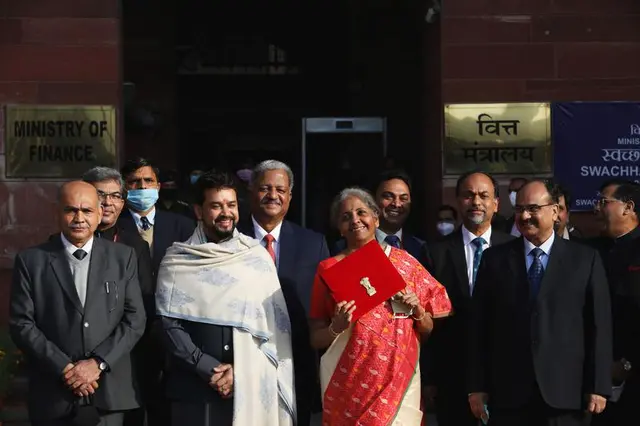By APD commentator Dong Yifan
Angela Merkel was re-elected as German chancellor by the Bundestag, or the lower house of the parliament, on Wednesday, which means the start of her fourth term and the end of the political deadlock in EU’s largest economy since September 2017.
The Merkel-led Christian Democratic Union (CDU), Christian Social Union (CSU) and Social Democratic Party (SPD) finally united again in the form of the grand coalition that largely reduces political uncertainties. However, the new government also faces challenges from opposition parties such as the far-right populist Alternative fuer Deutschland (AfD) and headaches from EU. Merkel has to spend more time to seek balance between German and Europe.
Compared with the previous party coalitions, this one is weak, which only has a slim 56 percent (399 out of total 709) of seats in the parliament. Moreover, the CDU/CSU bloc and SPD become more uncontrollable.
In the vote of confidence of the new government, just 364 coalition lawmakers supported Merkel, which suggested at least 35 members from the governing parties refused to back her. She only won only nine votes more than the absolute majority she needed.
So some analysts said the possibility of Merkel’s passing new acts is lowered compared with her previous third terms. Both CDU/CSU bloc and SPD have more reasons to bargain with Merkel even if they have fewer seats than before.
In CDU/CSU bloc, many lawmakers including CSU leader Horst Seehofer are unsatisfied with Merkel’s open-door refugee policy, not only because the decision was made by herself in 2015, but also the open-door approach has brought chaos to their country. For Seehofer, serving as interior minister means offering him a good chance of introducing a tougher refugee policy and pushing Merkel to consider their relatively conservative opinions on the Eurozone reform.
As for SPD, joining in the grand coalition not only means losing a huge number of their left-wing voters, but also weakening their traditional political advantages on environmental and social issues.
So SPD now faces dangerous splits in two aspects. On the one hand, some original supporters have veered to left-wing parties such as Die Linke. On the other hand, several important figures in SPD increase divisions of the party because the opinions they hold are quite different.
German President Frank-Walter Steinmeier is a kind guy but not strong enough to compete with Merkel and lead the whole SPD. Former European Parliament President Martin Schulz is experienced in European issues than other big guys, but unfamiliar with domestic issues because he has never hold any senior posts in the German government.
Though elected as the party’s new head in 2017, he could not win the majority of SPD since his softer and more pan-European policies have raised doubts of many voters that Germany’s fiscal interests may be sacrificed if they afford heavy burdens from the EU. As for former Foreign Minister Sigmar Gabriel, he likes showing off his own style and criticizing other politicians, offending many lawmakers both inside and outside SPD.
As a result, a divided and weaker SPD need get more political resources from the government, so SPD asked for more in the coalition talks several months before. Eventually SPD obtained positions of foreign minister and finance minister. So in Merkel’s fourth term, SPD will have the chances to roll out their ambitious policies on finance, social welfare and European-related issues.
More than divided and weaker coalition, the bigger trouble for Merkel comes from populism. One of the most important changes in the Bundestag is the rising of the AfD, which took their seats for the first time since it was established in 2013.
The right-wing populist party will absolutely gain more resources and play a bigger role in the parliament because it’s elected to chair the Bundestag’s budget, gets government subsidies for political parties and receives more media coverage. As the biggest opposition party, AfD will undoubtedly oppose any policies from the ruling grand coalition and push their populist ideas on Eurozone and immigrants, which may attract more people in the coalition who don’t satisfy the mainstream politics, making German politics more fragmented.
Moreover, the traditional parties have also absorbed some of populist ideas to address people’s concerns. For example, the interior ministry has tightened border checks on illegal refugees and limited the number of asylum seekers in order to meet the demands of Seehofer and the public. So it is expected that the Merkel’s policies will become more conservative than before.
Merkel may also be faced with new challenges in dealing with foreign affairs. Germany’s political deadlock has made EU issues stagnant for several months. During the period, EU’s integration process such as promoting the Permanent Structured Cooperation (PESCO) (its defense cooperation), and Eurozone overhaul had to stop and wait Germany’s answers.
But time waits for no one. French President Emmanuel Macron has shown his enthusiasm for supporting European integration, in the meantime, his strong leadership.
The result of Italy’s election also proved that traditional parties have lost their attractiveness and populism parties become more likely to rule the country as the northern league and the five-star movement started to seek cooperation.
A more populist Italy and a more powerful France are challenging Merkel, who must find balances between Germany’s fiscal rules and demands of Eurozone peripheral countries as soon as possible. If Germany changed its policy of finance projects, Italy might be hard hit by the financial crisis because the southern European country has a huge government debt problem and bad bank loans. Considering Italy’s position as the third biggest economies in euro zone, some analysts are anxious about the re-occurrence of financial crisis like Greece in 2015.
All in all, Merkel’s government means a new start of Europe, but the powerful woman must focus more on balancing her country and the whole EU.
Dong Yifan,assistant professor of European Studies Institute, China Institutes of Contemporary International Relations. His research areas covered European economy, EU integration and China-EU relations.
(ASIA PACIFIC DAILY)
 简体中文
简体中文

